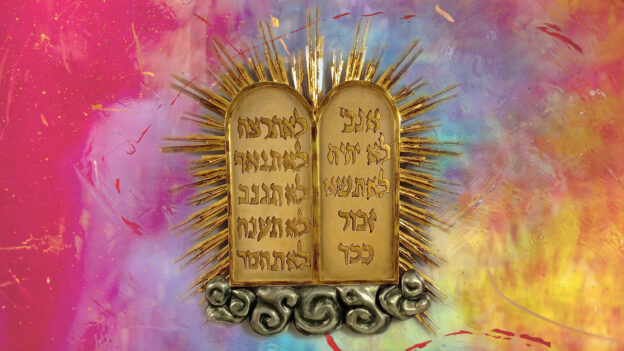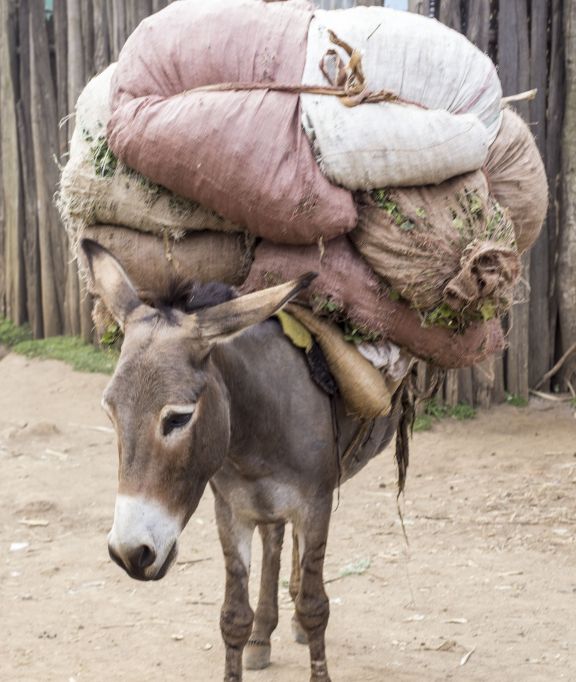Louisiana’s new law requiring the posting of the Aseres Hadibros in all public school classrooms disturbs me. Not because American children should revere the Commandments but for a different reason. Which you can read about here.


Louisiana’s new law requiring the posting of the Aseres Hadibros in all public school classrooms disturbs me. Not because American children should revere the Commandments but for a different reason. Which you can read about here.

Supreme Court Justice Samuel Alito was born in Trenton, New Jersey, is 74 years old… and… sit down if you must… is a social conservative!
Who knew?
To read why I wax somewhat cynical regarding that revelation, click here.

Folk maxims reflect truths, which is why the Talmud often invokes such aphorisms with the introduction“kidi’amri inshi” – “as people are wont to say.”
One valuable truth is the subject of two English sayings that don’t have a Talmudic aphorism-cognate. The truth, though, is telegraphed by the Torah itself, in one word, in parshas Behar.
“A stitch in time saves nine” and “an ounce of prevention is worth a pound of cure” both communicate the fact that a modest effort expended in a timely manner can prevent the need for a much greater effort down the line.
In the Torah, that message lies in the word “vihechezakta” – “and you should strengthen” in the pasuk “Should you brother become impoverished and his means falter near you, you should strengthen him, be he a stranger or resident…” (Vayikra 25:35).
Rashi notes that “stranger” refers to a non-Jew who has forsworn idolatry. And goes on to quote the Sifra: “Do not leave him by himself so that he comes down in the world until he finally falls altogether, when it will be hard to raise him. Rather, uphold him from the first moment of the failure of his means.”
The illustration provided is a donkey whose load is tottering. Rushing to straighten it is easy and will prevent the need to strain to lift it off the ground should it fall.
It’s an important, if straightforward, truth: Helping someone in even a small way early in a financial decline can prevent the need for a greater lift from a deeper poverty into which he may otherwise fall.
It can even save his life, as the pasuk continues, “And he will live with you.”
What I find interesting is that the English aphorisms are simple wise advice to an individual, about protecting himself from harm.
In the Torah, the truth is indicated in a word about protecting someone else.
© 2024 Rabbi Avi Shafran

Ultimate concern for oneself is ingrained in our essences. There is a striking Midrash on the pasuk “For my father and mother have abandoned me, and Hashem has gathered me in” (Tehillim 27:10). Dovid Hamelech, says the Midrash, was stating that his parents’ focus at his conception was on their personal relationship; it was about themselves, not him. In that sense, explains the Midrash, they “abandoned” him.
But consider: Dovid’s father was Yishai – one of the four people who Chazal tell us (Shabbos 55b) “died by the counsel of the nachash,” the serpent in Gan Eden. In other words, he was personally without sin. And yet he is being described as, in some way, selfish?
It seems clear that ultimate self-concern is part and parcel of being human. So no one can actually love another quite the same way he loves himself.
Nor can loving one’s fellow like himself mean that one must give each person he meets half of his possessions. That would render him penniless in short shrift.
R’ Meshullam Gross, in his sefer Nachalas Tzvi, notes that the wording of the imperative to love others like oneself uses the word lirei’acha (literally, “to one’s fellow”) rather than the simpler es rei’acha, echoing the wording of the commandment to “not covet… all that is to your fellow” in the Aseres Hadibros (Shemos 20:14).
Thus, he suggests, the imperative here is to consider the possessions – and honor, and concerns… – of one’s fellow as dear to you as if they were yours. In other words, love the fact that your fellow has what he has and deserves what he deserves – as much as you love what you have and feel you deserve.
© 2024 Rabbi Avi Shafran

Two indistinguishable goats were brought on Yom Kippur before the Kohein Gadol, who placed a randomly-pulled lot on the head of each animal. One lot read “to Hashem” and the other “to Azazel” – the name of a steep cliff in a barren desert.
The first was sacrificed as a holy korban; the second, taken to the cliff and thrown off, dying unceremoniously before even reaching the bottom.
There are two ways to view human life, either as the result of intent or the product of accident. And a corollary follows: Either our lives are meaningful, or they are not.
If the roots of our existence ultimately lie in randomness, there can be no more meaning to good and bad actions than to good or bad plays; no more import to right and wrong than to right and left. Societal norms can be promoted, but a social contract is a practical tool, not a moral imperative. Only if there is a Creator in the larger picture can there be ultimate import to human life, placing it on a plane meaningfully above that of mosquitoes.
The Torah’s most basic message is the meaningfulness of human life.
Might the goat brought as a korban symbolize recognition of the idea that humans are beholden to something greater? And the counter-goat, fate to a desolate, unholy place, allude to the perspective of life as pointless, lacking higher purpose?
Strangely, the Azazel-goat is described by the Torah as carrying away the people’s sins.
Might that mean that sin stems from not realizing how meaningful our lives are? And might a reminder about that idea on the holiest day of the Jewish year spur thoughts of repentance, of re-embracing the grand meaningfulness that is a human life?
© 2024 Rabbi Avi Shafran

We instinctively think of nega’im as born of lashon hora, “evil speech,” and we’re not wrong. But there is another birther of the condition, one that is evident in the very word metzora: tzarus ayin, “miserly eye” – selfish narrowmindedness, begrudging others one’s possessions.
That is particularly evident in the fact that, in the case of nig’ei batim, the tzara’as that afflicts walls of a house, the owner, before the house is declared tamei by a kohein, is told to take the home’s vulnerable vessels outside, exposing them to public view. What’s more, the Torah’s concern for the owner’s possessions stands as a lesson to him about caring for others’ needs.
Jews, as a people, are famously generous. We may be frugal, but that bespeaks something positive, our recognition of the worth of even small things. When it comes to charity, though, U.S. Jews per capita are more philanthropic than any other ethnic or religious community.
But tzarus ayin can manifest itself in a realm apart from charity. The Kli Yakar sees in the phrase “asher lo habayis” – “that is to him the house” (Vayikra 14:35) – an indication of a miser’s mindset: he thinks the house is truly his, when, in reality, it, like all we may think we “own,” is only temporarily in his control, on loan, so to speak, from Hashem.
Chazal created an entire class of imperatives based on that reality: birchos hanehenin, “blessings to be made before indulging.” When we recite a brachah before enjoying food or even fragrance, we are acknowledging that what is about to benefit us is from Hashem.
It’s ironic that a society like ours today, so blessed with such plenty, is not more careful when it comes to acknowledging our blessings. “Bruchanoi” may be somewhat reminiscent of the first three words of a brachah, but only somewhat. And quickly mumbling a brachah as some sort of irksome incantation without thinking about what its words mean is no replacement for summoning the gratitude the brachah is meant to express.
Even generous eyes can be miserly. Ours shouldn’t be.
© 2024 Rabbi Avi Shafran

An “aptronym” is a person’s name that is amusingly appropriate — like that of the lawyer named Sue Yoo, or of BBC meteorologist Sara Blizzard.
I’ve got another one, at least for Hebrew speakers. To read what it is, click here.

When describing the camel and pig, animals that lack either of the two signs required for their species to be considered consumable by Jews, the Torah’s wording is odd.
Kosher species require cud-chewing and split hooves, yet the camel, the text states, is forbidden “because it chews its cud, but does not have a [completely] split hoof”; and the pig, “because it has a cloven hoof that is completely split, but will not regurgitate its cud.” The “becauses” are seemingly misplaced, since the reason for the species’ forbiddance is for the lack of one kosher sign, not the presence of one.
Similar wording is used regarding the two other “one sign only” species mentioned, the hyrax and the hare.
The Kli Yakar perceives something poignant in the placement of the kosher signs after the “becauses.” He writes that “their pure sign adds extra impurity to their impurity, as we find that Chazal compared Esov to a pig that sticks out its hoofs when it lies down to make it appear as if it is kosher, but its inside is full of deceit. This represents anyone whose inside is not like his outside, in the manner of the hypocrites … Therefore, the pig’s split hoof is a sign of impurity because the split hoof can deceive people and make it appear as if it is kosher.”
The Chashmonai king Yannai, before he died, told his wife “Don’t be afraid of the Perushim [Torah-faithful Jews] or of those who are not Perushim, only of the hypocrites who present themselves as Perushim, for their actions are those of Zimri while they ask for reward like Pinchas received” (Sotah 22b).
Presenting oneself as a better version than that of one’s reality, Rav Yaakov Weinberg, zt”l, once told me, isn’t wrong – if one aspires to that better version. As the Chinuch put it, “what is on the outside can awaken the inside.”
But pretension for the sake of pretension is being, well, piggish.
© 2024 Rabbi Avi Shafran

A piece I wrote for Religion News Service about “brain death” can be read here.

Our ancestors’ wondering “Is Hashem in our midst or not?” is followed immediately in the Torah by Amalek’s attack (Shemos 17: 7-8). The word expressing Klal Yisrael’s existential doubt – “or not?” – is ayin, which can also be translated “isn’t,” “not there,” or “nothing.”
It’s a word that we find in a seemingly different context in Koheles (3:19), where Shlomo Hamelech says that u’mosar ha’adam min habeheima ayin – “and the superiority of man over animal is nothing.”
Which, as it happens, well encapsulates Amalek’s philosophy. Famously, its name in gematria equals safek, doubt, which reflects Amalek’s conviction that human life is meaningless, just the yield of random evolution, that there is in fact no essential difference between people and animals; and, thus, that there is no ultimate meaning to human life.
That sentiment, of course, isn’t Shlomo’s true conviction; he concludes Koheles with the statement that “kol ha’adam” – the essence of man” – is reverence for Hashem and fulfillment of His directives. The “no difference” pasuk is an unwarranted cry of exasperation, not a description of final fact.
I remember seeing a worthy thought about what that word ayin in the Koheles pasuk might hint at, rendering it not an uninformed cry but, rather, a statement of deep truth.
The first time the word ayin is used in the Torah is in the sentence: vi’adam ayin la’avod es ha’adama – “and man was not yet there to work the land” (Beraishis 2:5).
As Rashi explains, for the first vegetation to emerge, there needed to be rain, and rain would only arrive when there was a consciousness that could appreciate it as a divine gift. The “working” of the land, the avodah alluded to, was thus avodas haleiv, the “work of the heart” – a recognition and declaration of gratitude.
And so, the “difference between man and animal” may in fact be precisely “ayin” – namely, what the word hints at in Beraishis: awareness of Hashem and gratitude for His benevolence, which only conscious human beings can feel and express.
© 2024 Rabbi Avi Shafran